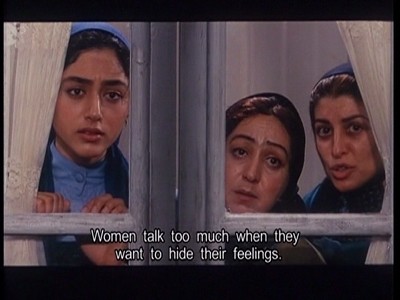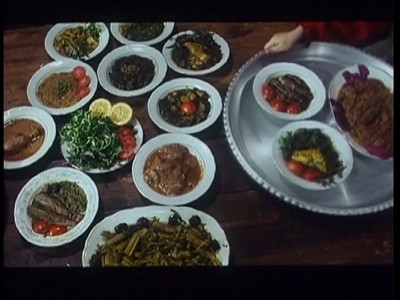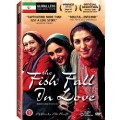| Reviews & Columns |
|
Reviews DVD TV on DVD Blu-ray 4K UHD International DVDs In Theaters Reviews by Studio Video Games Features Collector Series DVDs Easter Egg Database Interviews DVD Talk Radio Feature Articles Columns Anime Talk DVD Savant Horror DVDs The M.O.D. Squad Art House HD Talk Silent DVD
|
DVD Talk Forum |
|
|
| Resources |
|
DVD Price Search Customer Service #'s RCE Info Links |
|
Columns
|
|
|
Fish Fall in Love
First Run Features // Unrated // August 18, 2009
List Price: $24.95 [Buy now and save at Amazon]
 Fish raised in captivity do not taste as fine, we are told, as those who lived free; the idea is that only those of the open water had to fight their way upstream to mate, and their amorous adventures give them a courage and strength those bred at a farm could never achieve.
Fish raised in captivity do not taste as fine, we are told, as those who lived free; the idea is that only those of the open water had to fight their way upstream to mate, and their amorous adventures give them a courage and strength those bred at a farm could never achieve.It's a clever, romantic notion - and a clumsy, strained metaphor for the characters of "When Fish Fall in Love" ("Mahiha ashegh mishavand," also released internationally as "The Fish Fall in Love"), the screen debut from Iranian theater veteran Ali Rafii. The film shows us the upstream struggle of two couples, both working their way through lies and misunderstandings that come off as a little too pat, even if you take into account the Iranian political climate.
Perhaps it's all to sidestep the nation's censors. (Note that Rafii was heavily penalized in 2002 on moral charges.) Both couples find their relationships shattered when the men are arrested on political charges, yet the women are told only that they have "left town." There's clearly some not-so-between-the-lines commentary being made here about such practices, yet Rafii must bury this under the formulaic confusions of a standard romantic drama.
The story opens with Aziz (Reza Kianian) returning to his home town on the Caspian Sea after being locked away for twenty-some years as a political prisoner. He's hoping to find his former lover, Atieh (Roya Nonahali), who never learned of Aziz' true fate. After he left, she married an abusive (and now absent) man, raised a lovely daughter, Touka (Golshifteh Farahani), and now, with the help of some friends, runs a successful restaurant - which is located in Aziz' old house.
He's hoping she'll forgive him; she fears he's come to take back the house and kick the women out. Everyone hems and haws and connives to trick Aziz into not doing something he wasn't going to do anyway, and oh, how easily it would all be settled if only they would sit down for a quick conversation. So, too, would the subplot involving Touka and her lover Reza (Medhi Pakdel), also arrested in a modern mirroring of the older couple's long-ago troubles. Aziz remains tightlipped about his past and Reza's present, Rafii refusing to let his characters speak, even in whisper, the truth.
Looking in from foreign soil, we can only speculate the filmmaker's reasons. Is he wiggling his way around the censors, inventing wildly melodramatic reasons for the lies (the Touka/Reza storyline is drenched in romantic conniving and misplaced jealousies) to cover up the appearance of political bite? Or is Rafii merely content to allow the melodramatics to rule the story, and the "political prisoner" angle is nothing more than a storytelling device?
It doesn't help that Rafii makes Aziz confoundingly silent throughout. Rarely has a lead character been this frustrating to the viewer, yet in a way that never pays off in terms of dramatic intrigue. Aziz says little only because if he were to say more, the plot would collapse.
Throughout all of this, Rafii intends to turn our focus to cuisine. In the tradition of such foodie fare as "Eat Drink Man Woman," "Fish" spends much of its run time in the restaurant's kitchen. Atieh's plan is to win Aziz over with her cooking, a different signature meal each day, and the oblivious Aziz is eager to oblige her generosity. With Rafii's camera lingers on plates and pots, although the effect will vary depending on your appetite for Iranian dining. (The filmmaker seems at a loss for how to film food - the camera just sort of sits and hovers, often too long and without the necessary finesse. Fortunately, once the camera moves elsewhere, we're treated to some lovely views of the Caspian seaside.)
There's some enjoyable interplay between Nonahali, Farahani, and the other women of the picture, their characters allowed to grow beyond the kitchen and the melodrama. And it's here that "Fish" works best, providing us with a glimpse of women's life in rural Iran. Yet the glacial pace of the story and the dependence on tiresome genre cliché and stoic, indecipherable male characters to keep the plot afloat leaves "Fish" to become a rather dull affair.
 The DVD
The DVDFirst released internationally in 2006, "When Fish Fall in Love" finally comes to Region 1 courtesy First Run Features and the Global Film Initiative. The DVD cover labels the film under the alternate title "The Fish Fall in Love," yet the on-screen subtitles maintain the original title.
Video & Audio
It's tough to be mean to a print this bad - after all, the conditions under which the movie was made earn it some definite leeway, and fans of foreign cinema will be used to ignoring low marks for such things. And yet it can't be denied that "Fish" looks pretty rundown, with grain, softness, and muddy colors running rampant, all in a 1.85:1 non-anamorphic letterbox transfer.
The Persian stereo soundtrack also fares badly: the whole thing sounds muffled and distant, as if the speakers were wrapped in blankets and placed in another room. Non-removable English subtitles are included.
Extras
The only extras found on the DVD menu are pages of various text information on the Global Film Initiative and its "Global Lens Showcase," with accompanying trailer (2:24; 1.85:1 flat letterbox).
Accessible via your computer's DVD-Rom drive are PDF files of a twelve-page Discussion Guide (which includes brief paragraphs on Iranian cuisine and history and questions on the film's themes) and a four-page Fact Sheet (pretty much a press release, including cast and crew information and a Director's Statement).
Final Thoughts
Fans of Middle Eastern cinema might find the women's side of the story - and all that food - to be enough to make this worth a rental, but considering the unsatisfying drama and the muddy transfer, everyone else will do fine to just Skip It.
|
| Popular Reviews |
| Sponsored Links |
|
|
| Sponsored Links |
|
|
| Release List | Reviews | Shop | Newsletter | Forum | DVD Giveaways | Blu-Ray | Advertise |
|
Copyright 2024 DVDTalk.com All Rights Reserved. Legal Info, Privacy Policy, Terms of Use,
Manage Preferences,
Your Privacy Choices | |||||||













